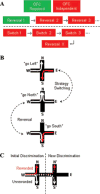The orbitofrontal cortex and response selection
- PMID: 22145872
- PMCID: PMC5545878
- DOI: 10.1111/j.1749-6632.2011.06279.x
The orbitofrontal cortex and response selection
Abstract
Orbitofrontal cortex (OFC) function is often characterized in terms of stimulus-reward mapping; however, more recent evidence suggests that the OFC may play a role in selecting and representing extended actions. First, previously encoded reward associations in the OFC could be used to inform responding in novel but similar situations. Second, when evaluated in tasks requiring the animal to perform extended actions, response selective activity can be recorded in the OFC. Finally, the interaction between the OFC and hippocampus illustrates OFC's role in response selection. The OFC may facilitate reward-guided memory retrieval by selecting the memories most relevant to achieve a goal. This model for OFC function places it within the hierarchy of increasingly complex action representations that support decision making.
© 2011 New York Academy of Sciences.
Conflict of interest statement
The authors declare no conflicts of interest.
Figures


References
-
- Damasio A. Descartes’ Error: Emotion, Reason, and the Human Brain. Penguin; London: 2005.
-
- Rolls ET. The orbitofrontal cortex and reward. Cereb. Cortex. 2000;10:284–294. - PubMed
Publication types
MeSH terms
Grants and funding
LinkOut - more resources
Full Text Sources
Medical

